Information/Write-up
Guido Basso was one of the most important and distinctive brass voices in Canadian music, whose career spanned jazz, television, studio recording, big band leadership, and popular orchestral work. Born in Montréal, Québec, he began playing trumpet at the age of nine and studied at the Conservatoire de musique du Québec à Montréal. By his early teens he was already working professionally, performing under the nickname “Stubby” Basso in dance bands and show orchestras led by figures such as Al Nichols and Maury Kaye.
While appearing with Kaye at El Morocco in Montréal, Basso was heard by American singer Vic Damone, who hired the young trumpeter and took him on tour in 1957–58. This marked the beginning of several years of steady work in the United States. From 1958 to 1960, Basso toured extensively across North America with Pearl Bailey and the orchestra led by her husband, drummer Louis Bellson, gaining first-hand experience in major concert halls, theatres, and television productions while still in his teens.
In 1960, Basso relocated to Toronto, where he quickly became one of the city’s most in-demand studio trumpeters. He was a first-call musician for recording sessions, radio broadcasts, film and television work, and commercial jingles, and his playing soon became embedded across a wide cross-section of Canadian popular recording beyond strictly jazz contexts. He was also noted for his versatility, occasionally taking on harmonica assignments alongside his brass work. Toronto would remain his professional base for the remainder of his career.
Basso became a familiar national presence through his long association with the CBC. From 1963 to 1967 he served as musical director for the CBC-TV program Nightcap, followed by similar duties for Barris and Company from 1968 to 1969. He co-starred with vibraphonist Peter Appleyard on the CBC-TV series Mallets and Brass in 1969, was musical director for CBC Radio’s After Noon from 1969 to 1971, and later led orchestras for two major CBC-TV series devoted to big band music, In the Mood (1971–72) and Bandwagon (1972–73). In 1975, he organized and led large ensembles for high-profile concerts at the Canadian National Exhibition featuring Dizzy Gillespie and Benny Goodman.
Alongside his broadcasting work, Basso remained active as a performer in Toronto nightclubs and hotel lounges, leading small groups that often blended jazz and Latin rhythms. He was also a central soloist with many of Canada’s leading jazz ensembles, including the Boss Brass, the Rob McConnell Tentet, Nimmons ’N’ Nine Plus Six, and the big bands of Ron Collier and others. His flugelhorn playing, in particular, became widely admired for its warmth, lyricism, and expressive control, qualities that were heard to great effect on numerous Boss Brass recordings.
At the same time, Basso’s studio career extended deeply into Canadian pop, rock, soul, reggae, and television recording. His trumpet appears on a remarkably broad range of sessions, including recordings by artists as stylistically distant as Jackie Mittoo and Teenage Head, illustrating his role as a trusted first-call professional whose sound moved effortlessly between jazz ensembles, pop productions, reggae sessions, and punk-era rock recordings. That same adaptability placed his playing firmly within the wider soundscape of Canadian broadcast culture, including appearances on hockey-related recordings such as Lafleur! and the Hockey Night in Canada theme.
Despite his stature within Canadian jazz, Basso was often reluctant to present himself strictly as a jazz artist, preferring to work across stylistic boundaries. He was nonetheless capable of incisive bebop trumpet work when required and became well known for his oft-quoted observation that “you attack a trumpet, and you make love to a flugelhorn,” a phrase that neatly summarized his approach to tone and phrasing.
As studio work declined in the late 1970s, Basso shifted much of his professional focus toward leading what became one of Toronto’s most successful society orchestras, maintaining a high level of performance activity well into later decades. His contributions to Canadian music were formally recognized in 1994, when he was appointed a Member of the Order of Canada. Guido Basso passed away on February 13, 2023, at the age of 85.
-Robert Williston
Musicians
Albert Pratz: violin
Joseph Sera: violin
Vicky Polley: violin
Harry Bergart: violin
Maurice Solway: violin
Stanley Kolt: violin
Frank Phillips: violin
Stan Soloman: viola
Eugene Hudson: viola
Peter Schenkman: cello
Ron Laurie: cello
Erich Traquott: trumpet
Arnie Chycoski: trumpet
Rainer Schmidt: trumpet
Rob McConnell: trombone
Ted Roderman: trombone
Ron Hughes: trombone
Russ Little: trombone
Bob Livingston: trombone
Fred Rizner: French horn
Moe Koffman: flute, saxophone
Bernie Pilch: flute, saxophone
Jerry Toth: flute, saxophone
Jack Zaza: flute, saxophone
Sid Beckwith: flute, saxophone
Sandra Watts: oboe, English horn
Judy Loman: harp
Peter Appleyard: percussion
Doug Riley: piano
Terry Clarke: drums
Ed Bickert: guitar
Jim Pirie: guitar
Terry Bush: guitar
Don Thompson: bass
Paul Zaza: bass
Production
Arrangements by Rick Wilkins and Jim Pirie
Produced by Dave Bird for Canadian Broadcasting Corporation in October 1970
Engineered by Ian Jacobson and Ken Bell
Liner notes
Poor old Mood Music. So many bad things have been done in her name.
Music to Clean Your Teeth By, when you’re in a drugstore deciding on a dentifrice. Music to Regret Your Teeth By, while sitting in a small waiting room, trying to maintain a cool before assorted whitechristly instruments, while looking at the Christian Youth Club of a meeting with a big close-up. Music to Get Your Teeth By, when you’re in an elevator and someone is singing schlocky.
Mood Music can be sad stuff indeed. But it needn’t be. And such as Paul Desmond and Bert Kaempfert, each of exquisite musical intent, unconvincing their hospital potentialities, have all recorded music to which you can listen, when feeling good. There’s nothing interesting fact about two of these masters — the former from Festival of Canada, the latter also a resident of the Channel islands and the latter of Los Angeles.
Add to that roster two more Canadian names: those of Rick Wilkins and Jim Pirie. When Guido Basso decided to choose his own title, these were the men he chose to write it.
And there are the great trumpet players. Guido is one of them, plus players who claim he is the finest trumpet player of all time. Guido has been playing horns of one kind or another since childhood. He had the usual high school band experience. He played cornet & big band with his native Toronto, and when he was 19, he played with the Benny Goodman orchestra. “I remember those nights when we’d be in their twenties,” Lars winther.
It was enough nightclubs before he was 19, Vic Damone heard him and took him to the road and the United Nations show. He’s been with Pearl Bailey, Ed Thigpen, Bellson’s wife, Pearl Bailey. He stayed with them before Nat King Cole heard him which was a major discovery. He became one of the major music-from-main-peters in the city.
Guido formed a septet to play on the CBC network TV show Nightcaps, long remembered by many Canadians. The first-runner of Lush Life. This is hardly surprising: Nightcaps’ leader, Chris Beard, went to Laugh-in and quit wearing many clothes; they had mad magazine material, blackouts, one-liners, and short sharp skits.
Guido wrote Nightcaps before he was able to become the kind of show leader who often adlibbed, who handled an hour of fascinating network radio show. He can now be heard on the CBC, and on record and radio shows everywhere.
This is how he made Guido’s sound — warm and intimate, almost personal in effect, and very human, almost vocal in its way. And when he plays each title here, the lyrical quality, a romanticism, about them.
And he is incredibly fluent on his instrument; that comes to him also, and the thing that keeps me humming for months, every time he comes to mind.
The rest of the record here is solidly proportioned: Put Your Hand in the Hand, Sweet Gingerbread Man, Too Late Now, and all the others — and the title song, Love Talk — have the appeal of the more serious kind of popular music. It’s more than that. For a few short minutes it is the mood, and you’re there.
It’ll always be the same. The sound of the trumpet is always the sound of someone else; it lingers, and some day it will be there.
One of these evenings when you’ve got some time and you want someone to call your own, get yourself a record player, and take Guido Basso home. Let yourself be soft with your lady. You’ll think of something.
Pauvre vieille musique d’atmosphère, quels crimes a-t-on commis en ton nom ? Musique pour se laver les dents quand vous êtes dans un drugstore pour décider quelle marque de dentifrice vous acheter. Musique pour oublier vos pénates pendant que vous êtes dans la salle d’attente de votre dentiste, essayant de garder votre calme, en regardant d’autres patients plus ou moins nerveux et tous ces instruments chrétiens blancs. Musique pour obtenir vos dents quand vous êtes dans un ascenseur avec un chanteur de chansons qui vole haut-parleur dissimulé dans le plafond.
Mais la musique d’ambiance peut être nécessaire, surtout si elle est le fruit de musiciens célèbres et respectés tels que Paul Desmond et Bert Kaempfert, chacun ayant enregistré des disques de haute qualité musicale et de faible potentiel hospitalier. Il est intéressant de noter que ces messieurs — le premier venu du Festival du Canada, le second habitant des îles Anglo-normandes et de Los Angeles.
Ajoutez à ces noms deux autres canadiens : Rick Wilkins et Jim Pirie que Guido Basso choisit pour composer la musique quand il décida d’entreprendre ce disque. Guido Basso est un de nos meilleurs trompettistes et certains de ses collègues disent qu’il est même le meilleur trompettiste de fugelhorn au monde.
Depuis son enfance Guido Basso a joué toutes sortes d’instruments. À l’âge de quatorze ans, il jouait dans une fanfare municipale et continuait avec un orchestre de jeunes. Il a fait ses études à l’école secondaire et à l’université. Il se souvient de l’époque où il avait l’impression de vivre dans vingt concerts divers chaque semaine.
Guido Basso travaillait dans des boîtes de nuit lorsqu’à l’âge de dix-neuf ans, Vic Damone l’entendit et l’amena en tournée pendant deux ans et demi. Il est ensuite revenu pour travailler avec Pearl Bailey et Louis Bellson. Nat King Cole l’engagea pour faire partie de son orchestre.
En 1960 il s’installa à Toronto qui à l’époque était déjà une des villes musicales du Canada. Il devint l’un des membres des trompettistes torontois les plus respectés. Guido Basso forma son propre septuor musical Nightcaps, qui devint bientôt un des plus grands succès diffusés du réseau de Radio-Canada. On y entendit des émissions telles Laugh-In et Mad magazine ; des saynètes, des sketches humoristiques, des direct Mchplo [sic] fameuses ; chansons d’artistes tels Lush Life, Chris Beard ; et Nightcaps resta.
Guido Basso fit ensuite une série d’émissions de radio et de télévision avec la chaleur et l’intimité que le son de la trompette ou du fugelhorn de jeu.
Son style particulier de Guido Basso le fait reconnaître immédiatement. Il est très humain et très vivant et sa musique est avant tout vocale. Son jeu possède des grandes qualités lyriques et romantiques et il semble presque qu’on entende une voix. Il arrive avec sa voix et son esprit et ce ne sont pas les titres ici présents qui vont me contredire : Put Your Hand In The Hand, Sweet Gingerbread Man, Too Late Now, Love Talk et Marion’s Theme (de la série télévisée Megantic Outlaw).
Ce disque vous offre à tous moments du plaisir musical et pas seulement pour quelques instants. La trompette est toujours la représentation d’un certain autre ; elle persiste et restera là un jour.
Et un de ces soirs vous avez une bouteille de bon vin et si vous avez une bouteille de bon vin et si vous avez une dame, vous trouverez que c’est une bonne idée.
-Gene Lees
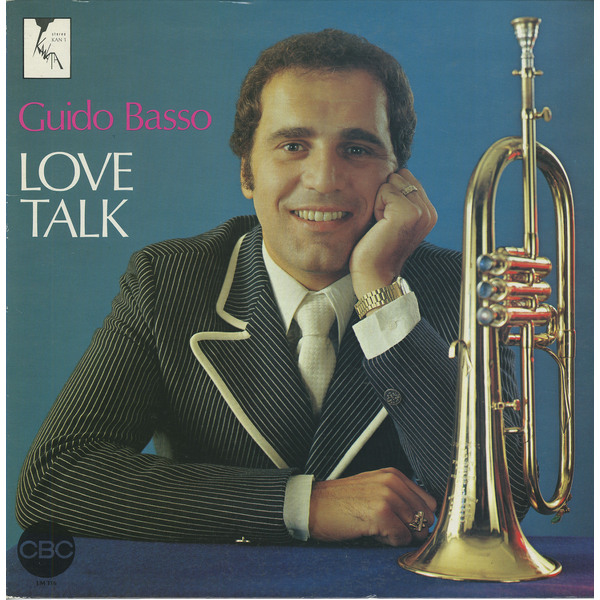
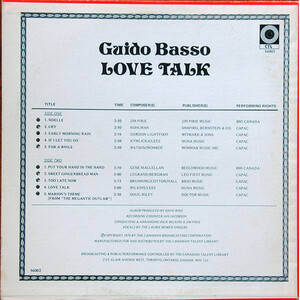
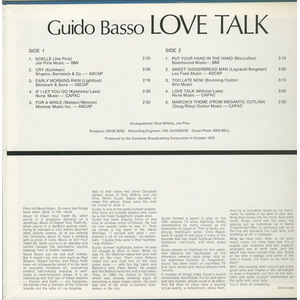
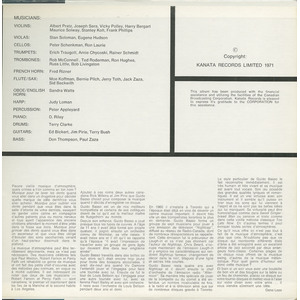
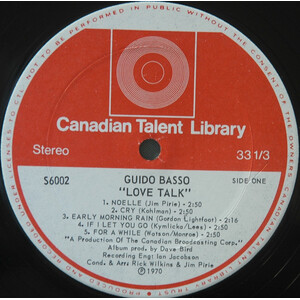
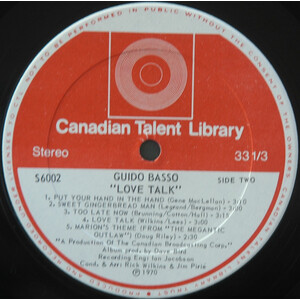
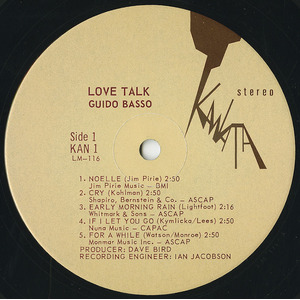
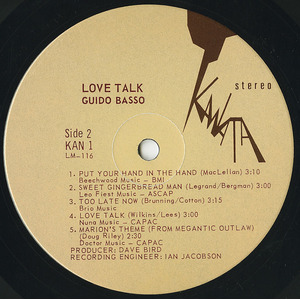

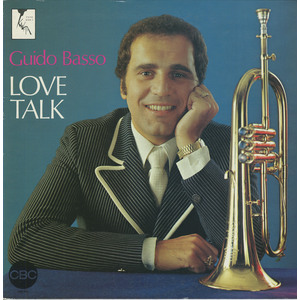
No Comments